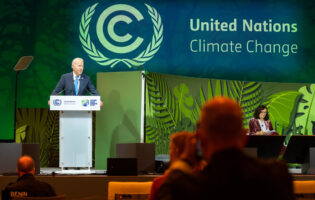
From the AGI Bookshelf: Germany’s Role in the Euro Crisis: Berlin’s Quest for a More Perfect Monetary Union

Jackson Janes
President Emeritus of AGI
Jackson Janes is the President Emeritus of the American-German Institute at the Johns Hopkins University in Washington, DC, where he has been affiliated since 1989.
Dr. Janes has been engaged in German-American affairs in numerous capacities over many years. He has studied and taught in German universities in Freiburg, Giessen and Tübingen. He was the Director of the German-American Institute in Tübingen (1977-1980) and then directed the European office of The German Marshall Fund of the United States in Bonn (1980-1985). Before joining AICGS, he served as Director of Program Development at the University Center for International Studies at the University of Pittsburgh (1986-1988). He was also Chair of the German Speaking Areas in Europe Program at the Foreign Service Institute in Washington, DC, from 1999-2000 and is Honorary President of the International Association for the Study of German Politics .
Dr. Janes is a member of the Council on Foreign Relations, the International Institute for Strategic Studies, the Atlantic Council of the United States, and American Purpose. He serves on the advisory boards of the Berlin office of the American Jewish Committee, and the Beirat der Zeitschrift für Außen- und Sicherheitspolitik (ZfAS). He serves on the Selection Committee for the Bundeskanzler Fellowships for the Alexander von Humboldt Foundation.
Dr. Janes has lectured throughout Europe and the United States and has published extensively on issues dealing with Germany, German-American relations, and transatlantic affairs. In addition to regular commentary given to European and American news radio, he has appeared on CBS, CNN, C-SPAN, PBS, CBC, and is a frequent commentator on German television. Dr. Janes is listed in Who’s Who in America and Who’s Who in Education.
In 2005, Dr. Janes was awarded the Officer’s Cross of the Order of Merit of the Federal Republic of Germany, Germany’s highest civilian award.
Education:
Ph.D., International Relations, Claremont Graduate School, Claremont, California
M.A., Divinity School, University of Chicago
B.A., Sociology, Colgate University
Expertise:
Transatlantic relations, German-American relations, domestic German politics, German-EU relations, transatlantic affairs.
__
The subtitle of this book, written by a former Research Fellow at AGI, is “Berlin’s Quest for a More Perfect Monetary Union.” The author has reviewed Germany’s efforts to find solutions to the challenges that have plagued the euro zone over the past several years. He essentially concludes that Berlin has to make some hard decisions and some difficult adjustments if the euro system is going to pull out of its current dilemma.
Meiers looks back at the difficulty of the crisis set in motion by both the global recession beginning in 2008 and the simultaneous fallout resulting from Athens’ failure to deal honestly with its economic problems. He examines the key role Germany played in dealing with Greece together with the ECB and the IMF, but he is blunt in his assessment that Germany’s management of the challenges demonstrated both excessive rigidity and hesitance, which leaves many of the problems for the euro unresolved.
Meiers first discusses the deeply ingrained “Ordoliberal” orientation to monetary and fiscal policy in the German culture, and suggests that that attitude has led to both an ineffective response to the euro crisis as well as the alienation of a good many of Germany’s neighbors. The expectation that the diverse collection of the euro zone members can adopt Germany’s equation of fiscal probity, price stability, and indeed its essential “economic creed” is not realistic. Nor is Germany’s enormous economic clout within the EU enough to force everyone to act accordingly. Meiers describes how Chancellor Merkel’s “tough love” approach to Greece had to eventually give way to ECB president Mario Draghi’s Bazooka tactics to prevent a total meltdown in the euro zone. But he also notes how Merkel was constantly trying to balance the innate belief in Berlin that the EU should not become a transfer union with the conviction that, as Merkel said, “If the euro fails, Europe fails.”
The problem for Europe, and for Germany in particular, in measuring how far the merging of sovereignty can go remains that balancing act. German political thinking has always been centered on the construction of a strong European Union. But as Germany’s role as the economic hegemon in Europe has strengthened over the past decade, its leadership is troubled with trying to articulate the right equation between its interests and those of its European partners. It is as if Germany is trying to become only a little bit pregnant with regard to the necessity of creating a full European monetary and fiscal policy structure. This has been aggravated by increasing distance between Germany and its most important partner—France, which has been experiencing its own severe economic challenges—and by espousing different economic policies for the euro zone.
In addition, the disparity in the members of the euro zone in terms of growth, unemployment, or productivity has added to the political tensions within member states of the euro zone as well as between euro zone partners. That in turn created political uncertainty within the governments of so many of these countries and had therefore contributed to the problems in dealing with their own economic policies in the presence of a increasingly demanding Berlin.
Meanwhile, Germany is also having difficulty adjusting to its elevated role as a economic and political power in Europe, particularly among the many crises emerging outside of the euro zone, such as the case in Ukraine and dealing with Russia. He describes Berlin’s struggle to define its leadership role when it seems to be in a quandary about how much economic influence it wishes to exercise and the reticence it feels to exercise political leadership in the geopolitical arena.
Meiers has essentially identified the transition Germany is making in its overall role in Europe. And it is not an easy one.
He describes the fundamental questions Germany faces as follows: how does Germany’s behavior determine the stability and success of the euro zone economy as a whole, from which it benefits so much and for which there are so many large responsibilities? While he suggests that the combination of fiscal, monetary, and structural policies are going to have to find more synergy to make the euro zone and indeed the European project stronger than it currently is, he believes that the strategy of Merkel’s cautious, step-by-step approach to these challenges may not be enough to adjust to what he refers to as the “new normal,” where compromises need to be accompanied by difficult decisions, particularly if Europe is going to aspire to achieving a union, even if it is not quite perfect.
Meiers lays out what that could look like: “A more perfect monetary union calls for a full banking union with significant risk sharing elements such as euro zone-wide bank resolution regime and a deposit and guarantee fund and a fiscal union that can absorb idiosyncratic shocks to specific member states by the federal budget.”
Just how Merkel can find her usual middle way between achieving a more effective monetary union, while the decision-making process she leads stays based in a national framework, remains to be seen. But it suggests that she has to come up with an answer as she faces another test of her political leadership, just as she faces another election in 2017.








